Group Case Study Analysis: HI6027 Business and Corporate Law, T2 2019
VerifiedAdded on 2022/10/02
|10
|2375
|443
Case Study
AI Summary
This document presents a comprehensive solution to a business and corporate law case study assignment. The assignment is divided into two parts: Part A addresses contract law principles, specifically focusing on offer, acceptance, and revocation in the context of a promotional offer by SOO Burgers. It analyzes whether two individuals, Mickey and Brett, can claim a prize based on their actions related to the promotion. Part B delves into company law, examining a scenario involving a loan agreement between a bank and a company, Sparkling, and the authority of the company's managing director. It explores issues of indoor management, the validity of contracts, and the recovery of the loan amount, considering the implications of the managing director's actions, the company's constitution, and the bank's knowledge of internal company affairs. The solution applies relevant legal rules and case precedents to provide reasoned conclusions for each issue, offering insights into the complexities of business law and corporate governance.
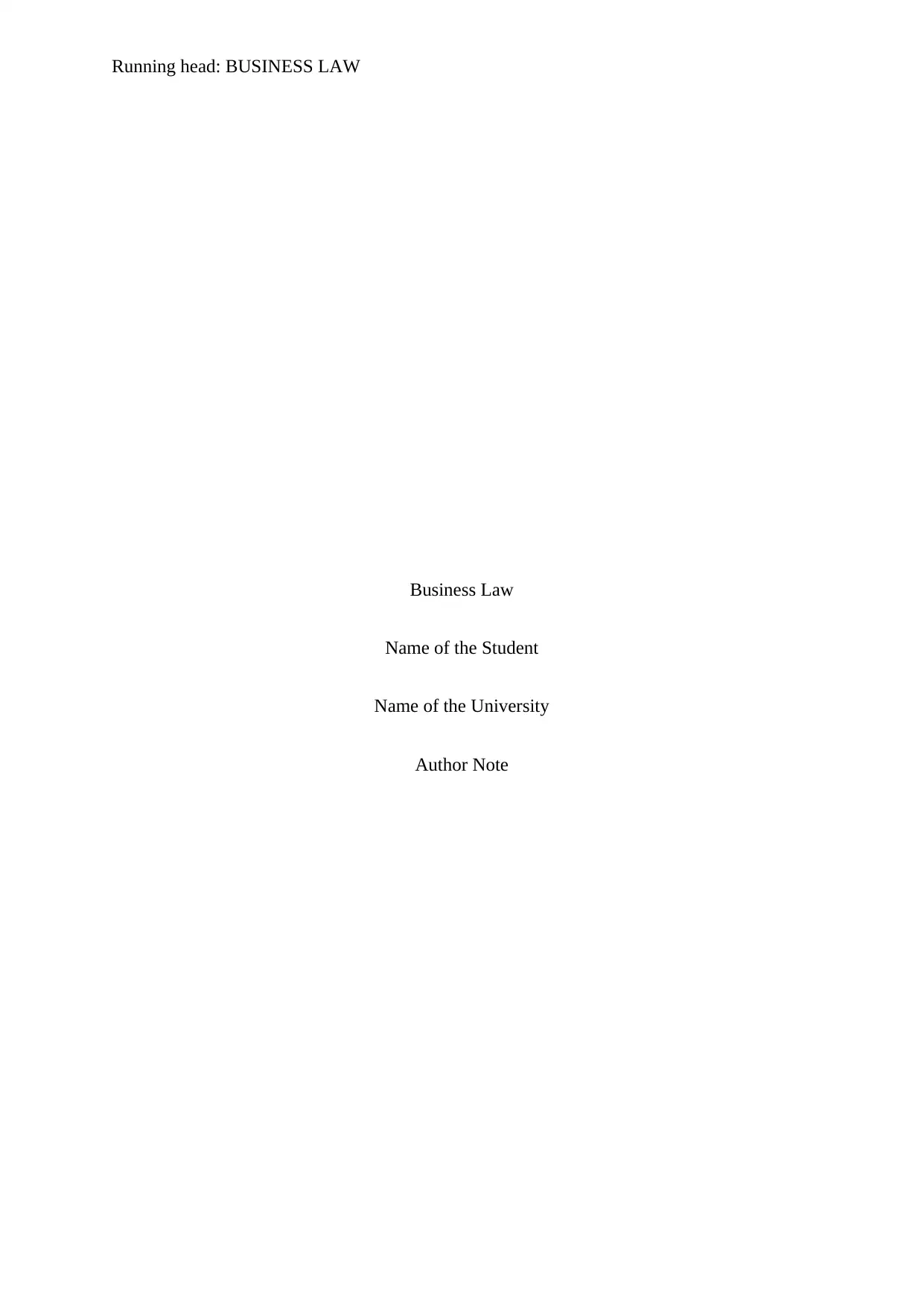
Running head: BUSINESS LAW
Business Law
Name of the Student
Name of the University
Author Note
Business Law
Name of the Student
Name of the University
Author Note
Paraphrase This Document
Need a fresh take? Get an instant paraphrase of this document with our AI Paraphraser
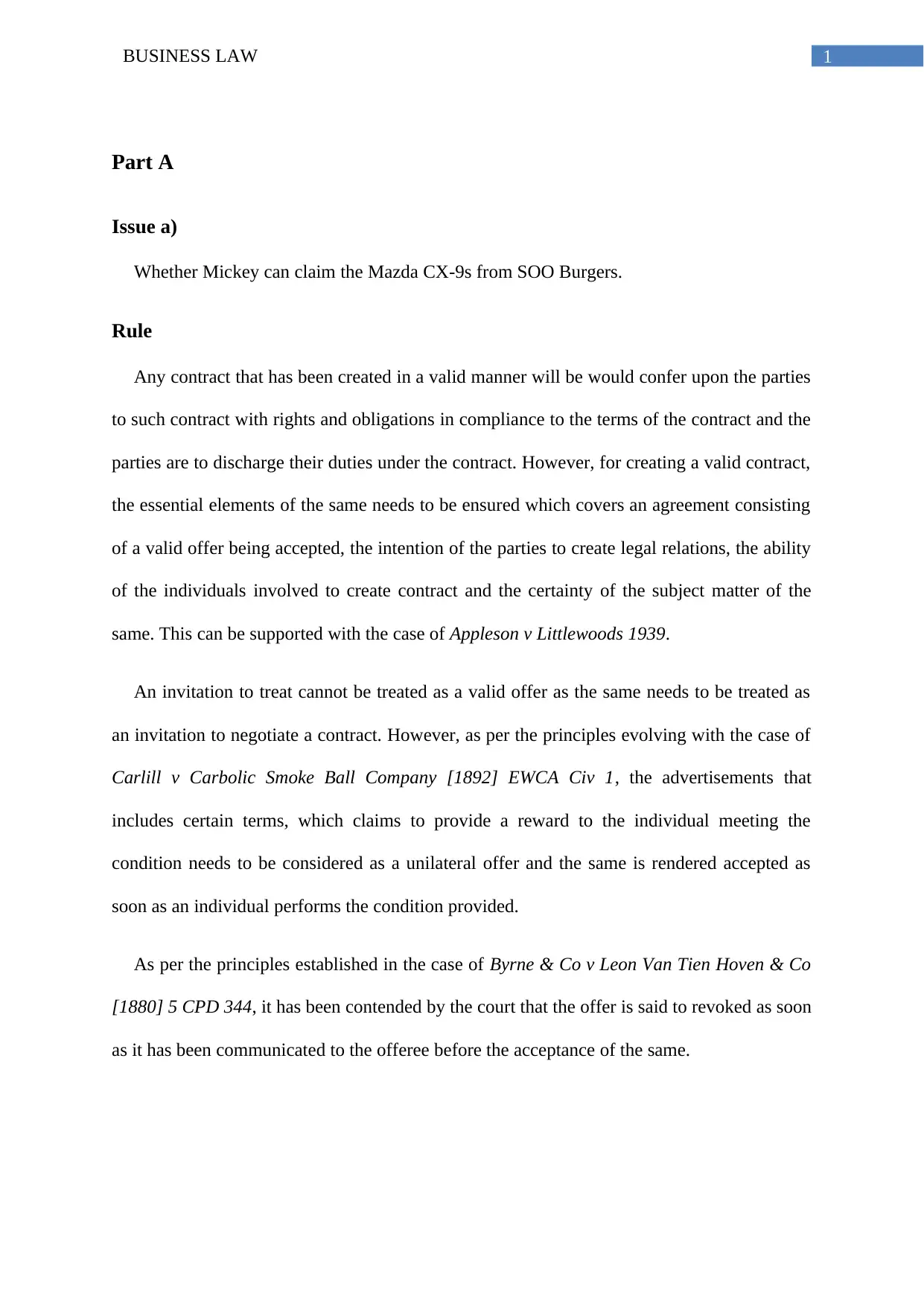
1BUSINESS LAW
Part A
Issue a)
Whether Mickey can claim the Mazda CX-9s from SOO Burgers.
Rule
Any contract that has been created in a valid manner will be would confer upon the parties
to such contract with rights and obligations in compliance to the terms of the contract and the
parties are to discharge their duties under the contract. However, for creating a valid contract,
the essential elements of the same needs to be ensured which covers an agreement consisting
of a valid offer being accepted, the intention of the parties to create legal relations, the ability
of the individuals involved to create contract and the certainty of the subject matter of the
same. This can be supported with the case of Appleson v Littlewoods 1939.
An invitation to treat cannot be treated as a valid offer as the same needs to be treated as
an invitation to negotiate a contract. However, as per the principles evolving with the case of
Carlill v Carbolic Smoke Ball Company [1892] EWCA Civ 1, the advertisements that
includes certain terms, which claims to provide a reward to the individual meeting the
condition needs to be considered as a unilateral offer and the same is rendered accepted as
soon as an individual performs the condition provided.
As per the principles established in the case of Byrne & Co v Leon Van Tien Hoven & Co
[1880] 5 CPD 344, it has been contended by the court that the offer is said to revoked as soon
as it has been communicated to the offeree before the acceptance of the same.
Part A
Issue a)
Whether Mickey can claim the Mazda CX-9s from SOO Burgers.
Rule
Any contract that has been created in a valid manner will be would confer upon the parties
to such contract with rights and obligations in compliance to the terms of the contract and the
parties are to discharge their duties under the contract. However, for creating a valid contract,
the essential elements of the same needs to be ensured which covers an agreement consisting
of a valid offer being accepted, the intention of the parties to create legal relations, the ability
of the individuals involved to create contract and the certainty of the subject matter of the
same. This can be supported with the case of Appleson v Littlewoods 1939.
An invitation to treat cannot be treated as a valid offer as the same needs to be treated as
an invitation to negotiate a contract. However, as per the principles evolving with the case of
Carlill v Carbolic Smoke Ball Company [1892] EWCA Civ 1, the advertisements that
includes certain terms, which claims to provide a reward to the individual meeting the
condition needs to be considered as a unilateral offer and the same is rendered accepted as
soon as an individual performs the condition provided.
As per the principles established in the case of Byrne & Co v Leon Van Tien Hoven & Co
[1880] 5 CPD 344, it has been contended by the court that the offer is said to revoked as soon
as it has been communicated to the offeree before the acceptance of the same.
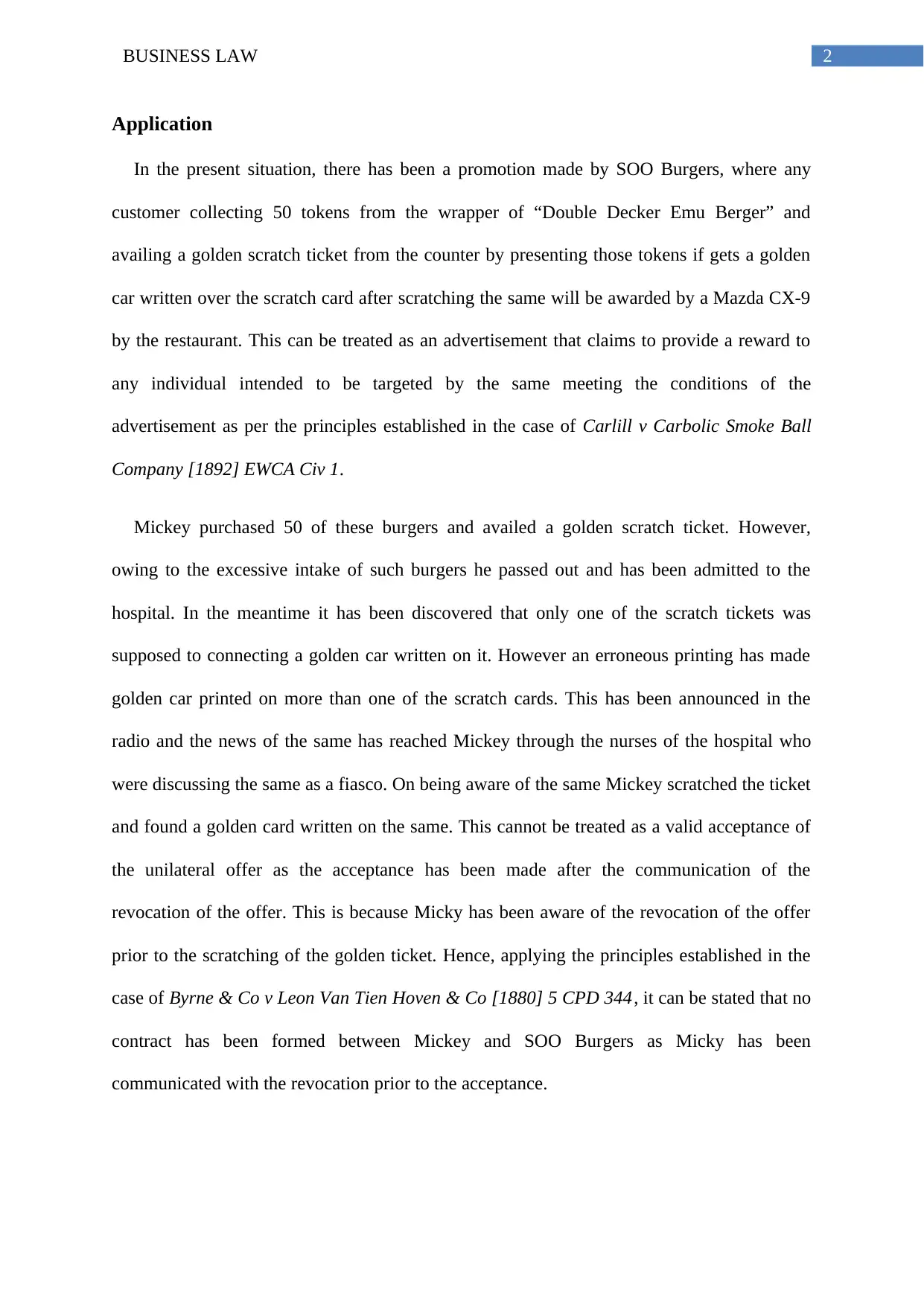
2BUSINESS LAW
Application
In the present situation, there has been a promotion made by SOO Burgers, where any
customer collecting 50 tokens from the wrapper of “Double Decker Emu Berger” and
availing a golden scratch ticket from the counter by presenting those tokens if gets a golden
car written over the scratch card after scratching the same will be awarded by a Mazda CX-9
by the restaurant. This can be treated as an advertisement that claims to provide a reward to
any individual intended to be targeted by the same meeting the conditions of the
advertisement as per the principles established in the case of Carlill v Carbolic Smoke Ball
Company [1892] EWCA Civ 1.
Mickey purchased 50 of these burgers and availed a golden scratch ticket. However,
owing to the excessive intake of such burgers he passed out and has been admitted to the
hospital. In the meantime it has been discovered that only one of the scratch tickets was
supposed to connecting a golden car written on it. However an erroneous printing has made
golden car printed on more than one of the scratch cards. This has been announced in the
radio and the news of the same has reached Mickey through the nurses of the hospital who
were discussing the same as a fiasco. On being aware of the same Mickey scratched the ticket
and found a golden card written on the same. This cannot be treated as a valid acceptance of
the unilateral offer as the acceptance has been made after the communication of the
revocation of the offer. This is because Micky has been aware of the revocation of the offer
prior to the scratching of the golden ticket. Hence, applying the principles established in the
case of Byrne & Co v Leon Van Tien Hoven & Co [1880] 5 CPD 344, it can be stated that no
contract has been formed between Mickey and SOO Burgers as Micky has been
communicated with the revocation prior to the acceptance.
Application
In the present situation, there has been a promotion made by SOO Burgers, where any
customer collecting 50 tokens from the wrapper of “Double Decker Emu Berger” and
availing a golden scratch ticket from the counter by presenting those tokens if gets a golden
car written over the scratch card after scratching the same will be awarded by a Mazda CX-9
by the restaurant. This can be treated as an advertisement that claims to provide a reward to
any individual intended to be targeted by the same meeting the conditions of the
advertisement as per the principles established in the case of Carlill v Carbolic Smoke Ball
Company [1892] EWCA Civ 1.
Mickey purchased 50 of these burgers and availed a golden scratch ticket. However,
owing to the excessive intake of such burgers he passed out and has been admitted to the
hospital. In the meantime it has been discovered that only one of the scratch tickets was
supposed to connecting a golden car written on it. However an erroneous printing has made
golden car printed on more than one of the scratch cards. This has been announced in the
radio and the news of the same has reached Mickey through the nurses of the hospital who
were discussing the same as a fiasco. On being aware of the same Mickey scratched the ticket
and found a golden card written on the same. This cannot be treated as a valid acceptance of
the unilateral offer as the acceptance has been made after the communication of the
revocation of the offer. This is because Micky has been aware of the revocation of the offer
prior to the scratching of the golden ticket. Hence, applying the principles established in the
case of Byrne & Co v Leon Van Tien Hoven & Co [1880] 5 CPD 344, it can be stated that no
contract has been formed between Mickey and SOO Burgers as Micky has been
communicated with the revocation prior to the acceptance.
⊘ This is a preview!⊘
Do you want full access?
Subscribe today to unlock all pages.

Trusted by 1+ million students worldwide
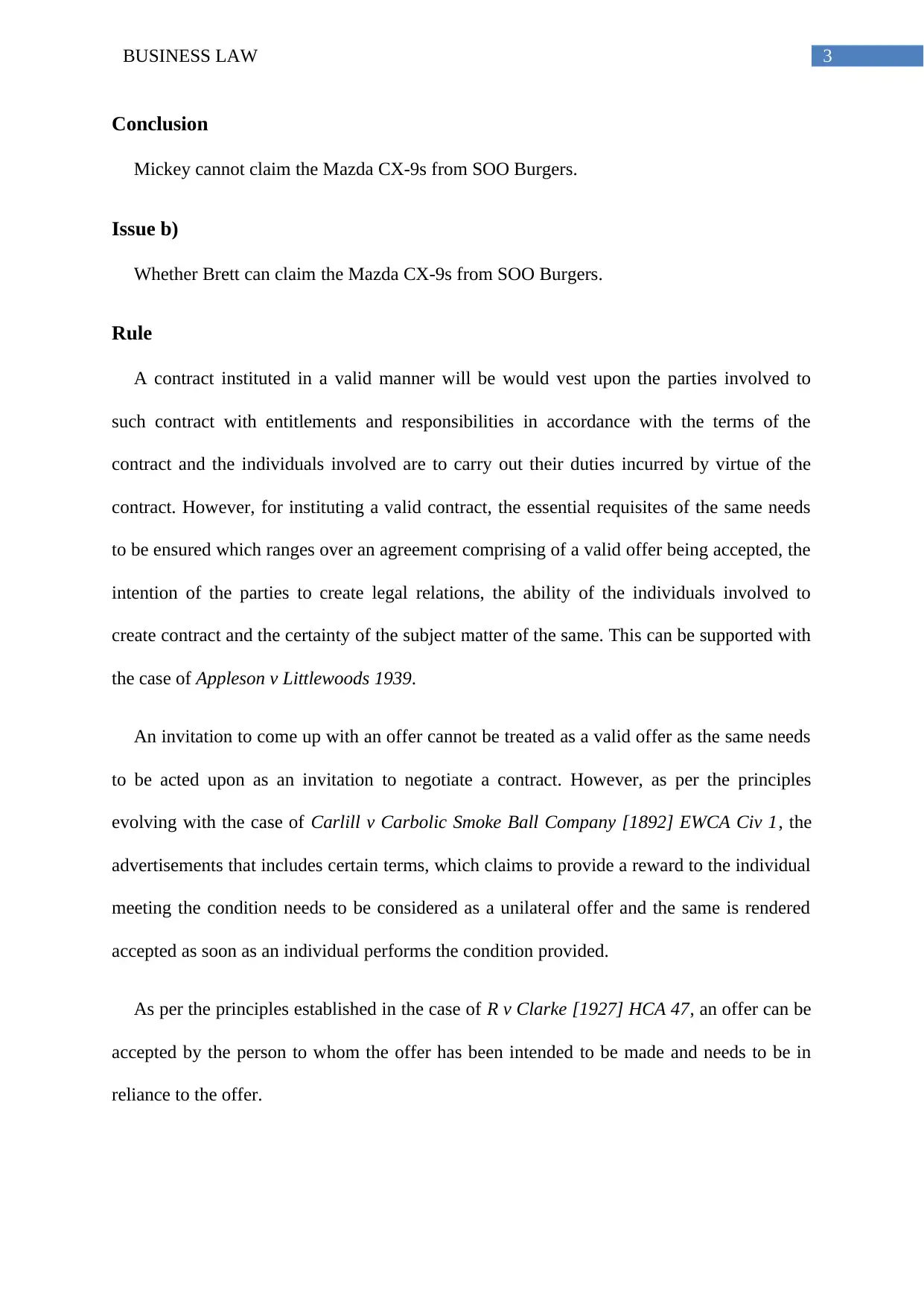
3BUSINESS LAW
Conclusion
Mickey cannot claim the Mazda CX-9s from SOO Burgers.
Issue b)
Whether Brett can claim the Mazda CX-9s from SOO Burgers.
Rule
A contract instituted in a valid manner will be would vest upon the parties involved to
such contract with entitlements and responsibilities in accordance with the terms of the
contract and the individuals involved are to carry out their duties incurred by virtue of the
contract. However, for instituting a valid contract, the essential requisites of the same needs
to be ensured which ranges over an agreement comprising of a valid offer being accepted, the
intention of the parties to create legal relations, the ability of the individuals involved to
create contract and the certainty of the subject matter of the same. This can be supported with
the case of Appleson v Littlewoods 1939.
An invitation to come up with an offer cannot be treated as a valid offer as the same needs
to be acted upon as an invitation to negotiate a contract. However, as per the principles
evolving with the case of Carlill v Carbolic Smoke Ball Company [1892] EWCA Civ 1, the
advertisements that includes certain terms, which claims to provide a reward to the individual
meeting the condition needs to be considered as a unilateral offer and the same is rendered
accepted as soon as an individual performs the condition provided.
As per the principles established in the case of R v Clarke [1927] HCA 47, an offer can be
accepted by the person to whom the offer has been intended to be made and needs to be in
reliance to the offer.
Conclusion
Mickey cannot claim the Mazda CX-9s from SOO Burgers.
Issue b)
Whether Brett can claim the Mazda CX-9s from SOO Burgers.
Rule
A contract instituted in a valid manner will be would vest upon the parties involved to
such contract with entitlements and responsibilities in accordance with the terms of the
contract and the individuals involved are to carry out their duties incurred by virtue of the
contract. However, for instituting a valid contract, the essential requisites of the same needs
to be ensured which ranges over an agreement comprising of a valid offer being accepted, the
intention of the parties to create legal relations, the ability of the individuals involved to
create contract and the certainty of the subject matter of the same. This can be supported with
the case of Appleson v Littlewoods 1939.
An invitation to come up with an offer cannot be treated as a valid offer as the same needs
to be acted upon as an invitation to negotiate a contract. However, as per the principles
evolving with the case of Carlill v Carbolic Smoke Ball Company [1892] EWCA Civ 1, the
advertisements that includes certain terms, which claims to provide a reward to the individual
meeting the condition needs to be considered as a unilateral offer and the same is rendered
accepted as soon as an individual performs the condition provided.
As per the principles established in the case of R v Clarke [1927] HCA 47, an offer can be
accepted by the person to whom the offer has been intended to be made and needs to be in
reliance to the offer.
Paraphrase This Document
Need a fresh take? Get an instant paraphrase of this document with our AI Paraphraser
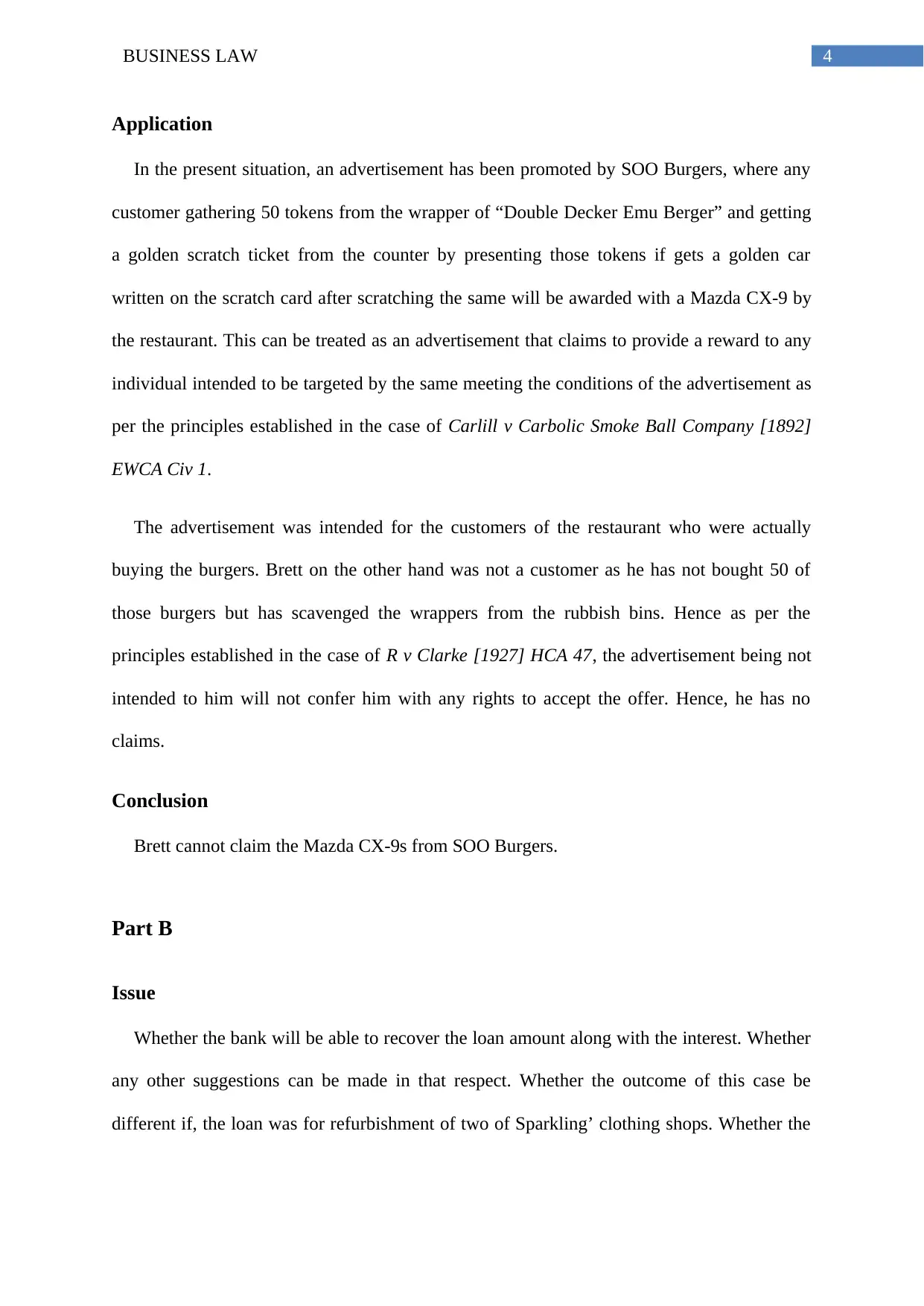
4BUSINESS LAW
Application
In the present situation, an advertisement has been promoted by SOO Burgers, where any
customer gathering 50 tokens from the wrapper of “Double Decker Emu Berger” and getting
a golden scratch ticket from the counter by presenting those tokens if gets a golden car
written on the scratch card after scratching the same will be awarded with a Mazda CX-9 by
the restaurant. This can be treated as an advertisement that claims to provide a reward to any
individual intended to be targeted by the same meeting the conditions of the advertisement as
per the principles established in the case of Carlill v Carbolic Smoke Ball Company [1892]
EWCA Civ 1.
The advertisement was intended for the customers of the restaurant who were actually
buying the burgers. Brett on the other hand was not a customer as he has not bought 50 of
those burgers but has scavenged the wrappers from the rubbish bins. Hence as per the
principles established in the case of R v Clarke [1927] HCA 47, the advertisement being not
intended to him will not confer him with any rights to accept the offer. Hence, he has no
claims.
Conclusion
Brett cannot claim the Mazda CX-9s from SOO Burgers.
Part B
Issue
Whether the bank will be able to recover the loan amount along with the interest. Whether
any other suggestions can be made in that respect. Whether the outcome of this case be
different if, the loan was for refurbishment of two of Sparkling’ clothing shops. Whether the
Application
In the present situation, an advertisement has been promoted by SOO Burgers, where any
customer gathering 50 tokens from the wrapper of “Double Decker Emu Berger” and getting
a golden scratch ticket from the counter by presenting those tokens if gets a golden car
written on the scratch card after scratching the same will be awarded with a Mazda CX-9 by
the restaurant. This can be treated as an advertisement that claims to provide a reward to any
individual intended to be targeted by the same meeting the conditions of the advertisement as
per the principles established in the case of Carlill v Carbolic Smoke Ball Company [1892]
EWCA Civ 1.
The advertisement was intended for the customers of the restaurant who were actually
buying the burgers. Brett on the other hand was not a customer as he has not bought 50 of
those burgers but has scavenged the wrappers from the rubbish bins. Hence as per the
principles established in the case of R v Clarke [1927] HCA 47, the advertisement being not
intended to him will not confer him with any rights to accept the offer. Hence, he has no
claims.
Conclusion
Brett cannot claim the Mazda CX-9s from SOO Burgers.
Part B
Issue
Whether the bank will be able to recover the loan amount along with the interest. Whether
any other suggestions can be made in that respect. Whether the outcome of this case be
different if, the loan was for refurbishment of two of Sparkling’ clothing shops. Whether the
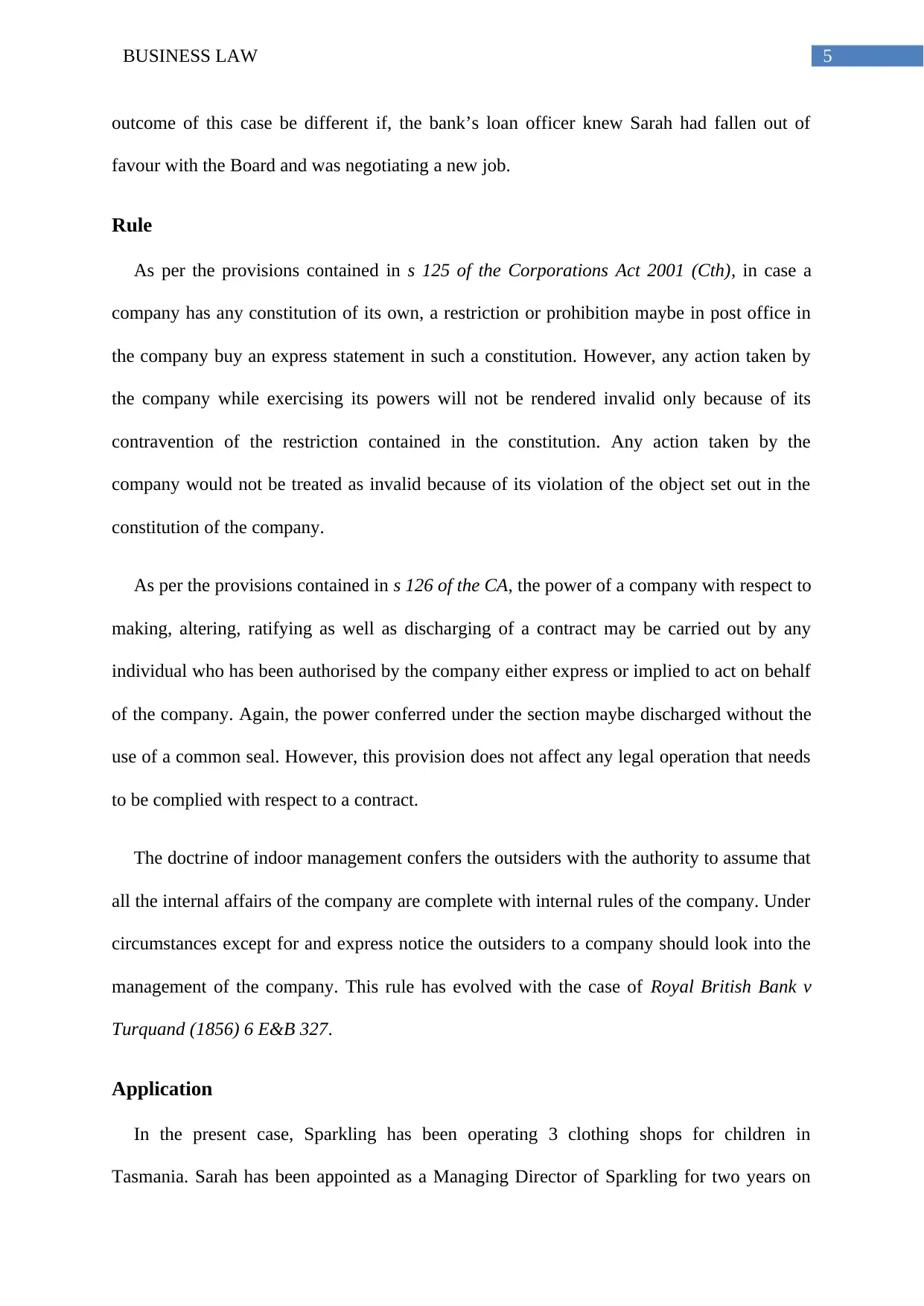
5BUSINESS LAW
outcome of this case be different if, the bank’s loan officer knew Sarah had fallen out of
favour with the Board and was negotiating a new job.
Rule
As per the provisions contained in s 125 of the Corporations Act 2001 (Cth), in case a
company has any constitution of its own, a restriction or prohibition maybe in post office in
the company buy an express statement in such a constitution. However, any action taken by
the company while exercising its powers will not be rendered invalid only because of its
contravention of the restriction contained in the constitution. Any action taken by the
company would not be treated as invalid because of its violation of the object set out in the
constitution of the company.
As per the provisions contained in s 126 of the CA, the power of a company with respect to
making, altering, ratifying as well as discharging of a contract may be carried out by any
individual who has been authorised by the company either express or implied to act on behalf
of the company. Again, the power conferred under the section maybe discharged without the
use of a common seal. However, this provision does not affect any legal operation that needs
to be complied with respect to a contract.
The doctrine of indoor management confers the outsiders with the authority to assume that
all the internal affairs of the company are complete with internal rules of the company. Under
circumstances except for and express notice the outsiders to a company should look into the
management of the company. This rule has evolved with the case of Royal British Bank v
Turquand (1856) 6 E&B 327.
Application
In the present case, Sparkling has been operating 3 clothing shops for children in
Tasmania. Sarah has been appointed as a Managing Director of Sparkling for two years on
outcome of this case be different if, the bank’s loan officer knew Sarah had fallen out of
favour with the Board and was negotiating a new job.
Rule
As per the provisions contained in s 125 of the Corporations Act 2001 (Cth), in case a
company has any constitution of its own, a restriction or prohibition maybe in post office in
the company buy an express statement in such a constitution. However, any action taken by
the company while exercising its powers will not be rendered invalid only because of its
contravention of the restriction contained in the constitution. Any action taken by the
company would not be treated as invalid because of its violation of the object set out in the
constitution of the company.
As per the provisions contained in s 126 of the CA, the power of a company with respect to
making, altering, ratifying as well as discharging of a contract may be carried out by any
individual who has been authorised by the company either express or implied to act on behalf
of the company. Again, the power conferred under the section maybe discharged without the
use of a common seal. However, this provision does not affect any legal operation that needs
to be complied with respect to a contract.
The doctrine of indoor management confers the outsiders with the authority to assume that
all the internal affairs of the company are complete with internal rules of the company. Under
circumstances except for and express notice the outsiders to a company should look into the
management of the company. This rule has evolved with the case of Royal British Bank v
Turquand (1856) 6 E&B 327.
Application
In the present case, Sparkling has been operating 3 clothing shops for children in
Tasmania. Sarah has been appointed as a Managing Director of Sparkling for two years on
⊘ This is a preview!⊘
Do you want full access?
Subscribe today to unlock all pages.

Trusted by 1+ million students worldwide
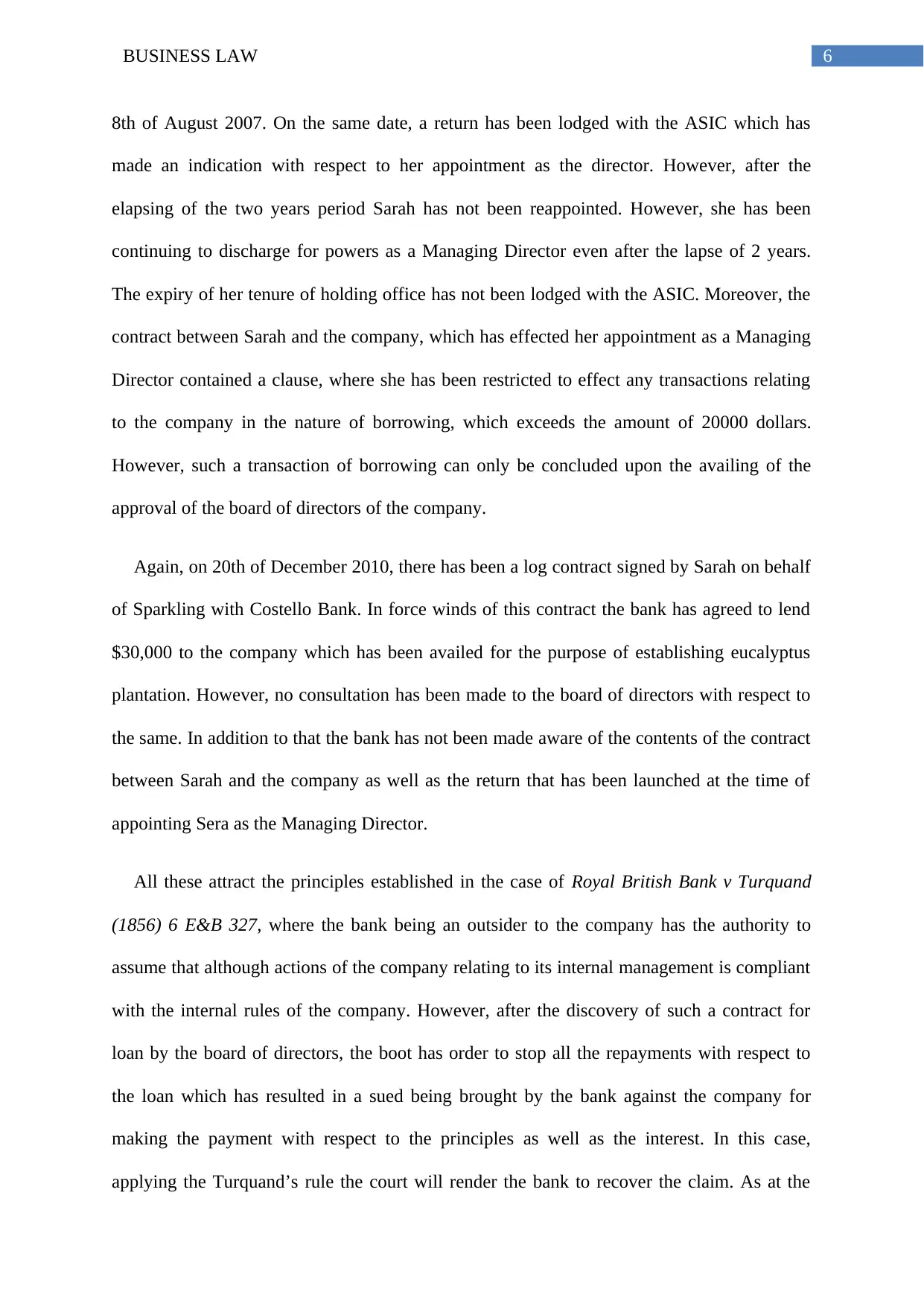
6BUSINESS LAW
8th of August 2007. On the same date, a return has been lodged with the ASIC which has
made an indication with respect to her appointment as the director. However, after the
elapsing of the two years period Sarah has not been reappointed. However, she has been
continuing to discharge for powers as a Managing Director even after the lapse of 2 years.
The expiry of her tenure of holding office has not been lodged with the ASIC. Moreover, the
contract between Sarah and the company, which has effected her appointment as a Managing
Director contained a clause, where she has been restricted to effect any transactions relating
to the company in the nature of borrowing, which exceeds the amount of 20000 dollars.
However, such a transaction of borrowing can only be concluded upon the availing of the
approval of the board of directors of the company.
Again, on 20th of December 2010, there has been a log contract signed by Sarah on behalf
of Sparkling with Costello Bank. In force winds of this contract the bank has agreed to lend
$30,000 to the company which has been availed for the purpose of establishing eucalyptus
plantation. However, no consultation has been made to the board of directors with respect to
the same. In addition to that the bank has not been made aware of the contents of the contract
between Sarah and the company as well as the return that has been launched at the time of
appointing Sera as the Managing Director.
All these attract the principles established in the case of Royal British Bank v Turquand
(1856) 6 E&B 327, where the bank being an outsider to the company has the authority to
assume that although actions of the company relating to its internal management is compliant
with the internal rules of the company. However, after the discovery of such a contract for
loan by the board of directors, the boot has order to stop all the repayments with respect to
the loan which has resulted in a sued being brought by the bank against the company for
making the payment with respect to the principles as well as the interest. In this case,
applying the Turquand’s rule the court will render the bank to recover the claim. As at the
8th of August 2007. On the same date, a return has been lodged with the ASIC which has
made an indication with respect to her appointment as the director. However, after the
elapsing of the two years period Sarah has not been reappointed. However, she has been
continuing to discharge for powers as a Managing Director even after the lapse of 2 years.
The expiry of her tenure of holding office has not been lodged with the ASIC. Moreover, the
contract between Sarah and the company, which has effected her appointment as a Managing
Director contained a clause, where she has been restricted to effect any transactions relating
to the company in the nature of borrowing, which exceeds the amount of 20000 dollars.
However, such a transaction of borrowing can only be concluded upon the availing of the
approval of the board of directors of the company.
Again, on 20th of December 2010, there has been a log contract signed by Sarah on behalf
of Sparkling with Costello Bank. In force winds of this contract the bank has agreed to lend
$30,000 to the company which has been availed for the purpose of establishing eucalyptus
plantation. However, no consultation has been made to the board of directors with respect to
the same. In addition to that the bank has not been made aware of the contents of the contract
between Sarah and the company as well as the return that has been launched at the time of
appointing Sera as the Managing Director.
All these attract the principles established in the case of Royal British Bank v Turquand
(1856) 6 E&B 327, where the bank being an outsider to the company has the authority to
assume that although actions of the company relating to its internal management is compliant
with the internal rules of the company. However, after the discovery of such a contract for
loan by the board of directors, the boot has order to stop all the repayments with respect to
the loan which has resulted in a sued being brought by the bank against the company for
making the payment with respect to the principles as well as the interest. In this case,
applying the Turquand’s rule the court will render the bank to recover the claim. As at the
Paraphrase This Document
Need a fresh take? Get an instant paraphrase of this document with our AI Paraphraser
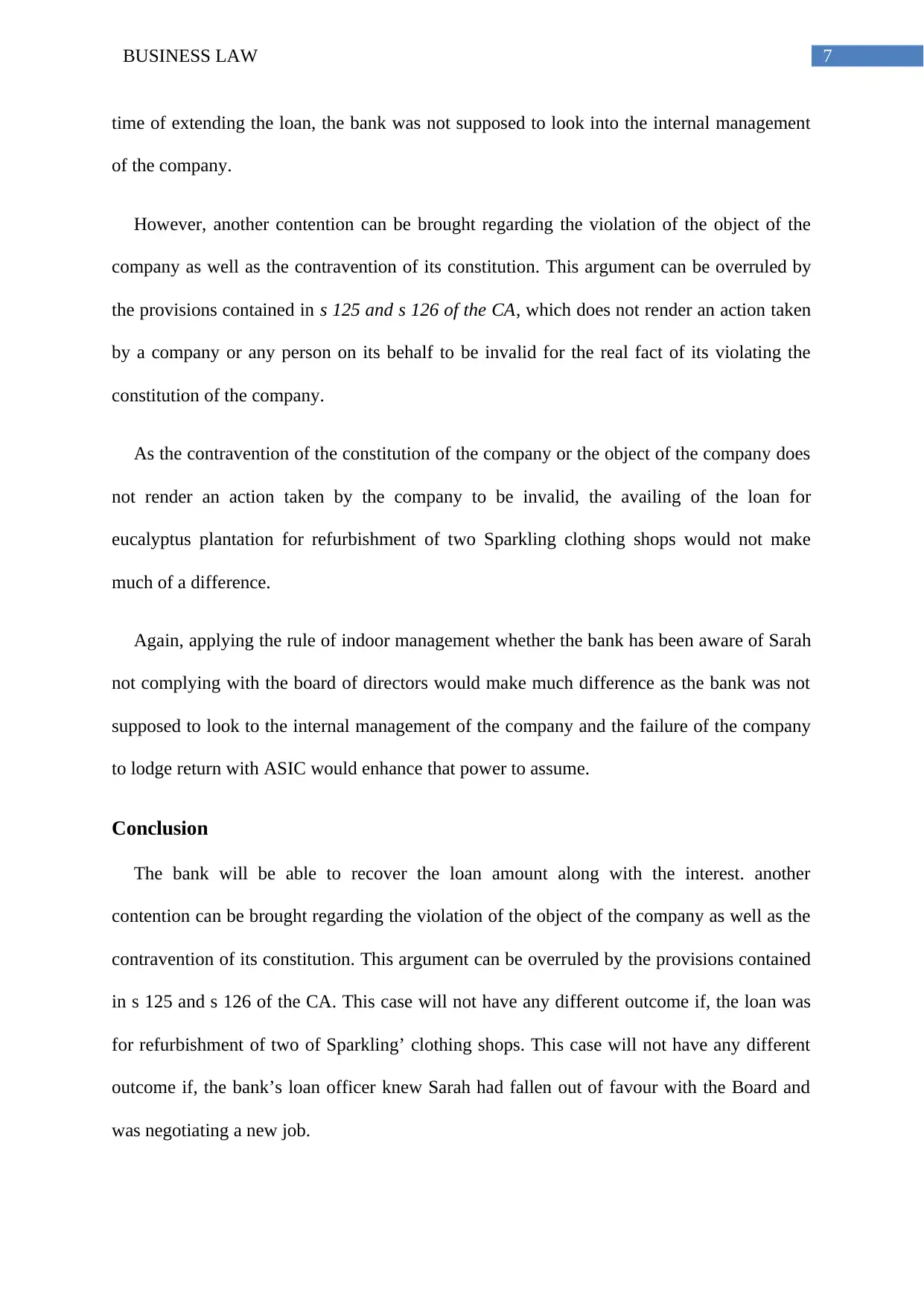
7BUSINESS LAW
time of extending the loan, the bank was not supposed to look into the internal management
of the company.
However, another contention can be brought regarding the violation of the object of the
company as well as the contravention of its constitution. This argument can be overruled by
the provisions contained in s 125 and s 126 of the CA, which does not render an action taken
by a company or any person on its behalf to be invalid for the real fact of its violating the
constitution of the company.
As the contravention of the constitution of the company or the object of the company does
not render an action taken by the company to be invalid, the availing of the loan for
eucalyptus plantation for refurbishment of two Sparkling clothing shops would not make
much of a difference.
Again, applying the rule of indoor management whether the bank has been aware of Sarah
not complying with the board of directors would make much difference as the bank was not
supposed to look to the internal management of the company and the failure of the company
to lodge return with ASIC would enhance that power to assume.
Conclusion
The bank will be able to recover the loan amount along with the interest. another
contention can be brought regarding the violation of the object of the company as well as the
contravention of its constitution. This argument can be overruled by the provisions contained
in s 125 and s 126 of the CA. This case will not have any different outcome if, the loan was
for refurbishment of two of Sparkling’ clothing shops. This case will not have any different
outcome if, the bank’s loan officer knew Sarah had fallen out of favour with the Board and
was negotiating a new job.
time of extending the loan, the bank was not supposed to look into the internal management
of the company.
However, another contention can be brought regarding the violation of the object of the
company as well as the contravention of its constitution. This argument can be overruled by
the provisions contained in s 125 and s 126 of the CA, which does not render an action taken
by a company or any person on its behalf to be invalid for the real fact of its violating the
constitution of the company.
As the contravention of the constitution of the company or the object of the company does
not render an action taken by the company to be invalid, the availing of the loan for
eucalyptus plantation for refurbishment of two Sparkling clothing shops would not make
much of a difference.
Again, applying the rule of indoor management whether the bank has been aware of Sarah
not complying with the board of directors would make much difference as the bank was not
supposed to look to the internal management of the company and the failure of the company
to lodge return with ASIC would enhance that power to assume.
Conclusion
The bank will be able to recover the loan amount along with the interest. another
contention can be brought regarding the violation of the object of the company as well as the
contravention of its constitution. This argument can be overruled by the provisions contained
in s 125 and s 126 of the CA. This case will not have any different outcome if, the loan was
for refurbishment of two of Sparkling’ clothing shops. This case will not have any different
outcome if, the bank’s loan officer knew Sarah had fallen out of favour with the Board and
was negotiating a new job.
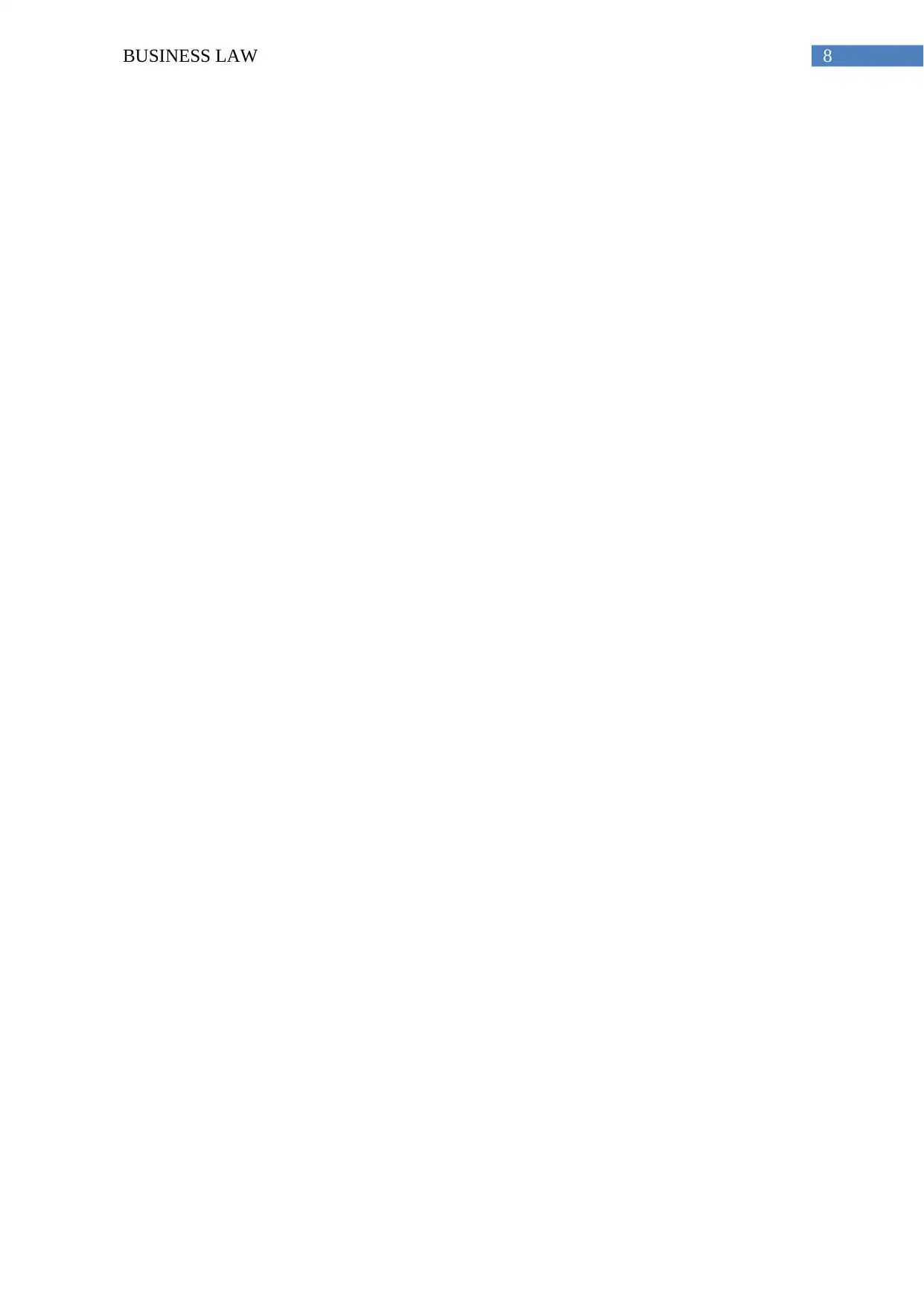
8BUSINESS LAW
⊘ This is a preview!⊘
Do you want full access?
Subscribe today to unlock all pages.

Trusted by 1+ million students worldwide
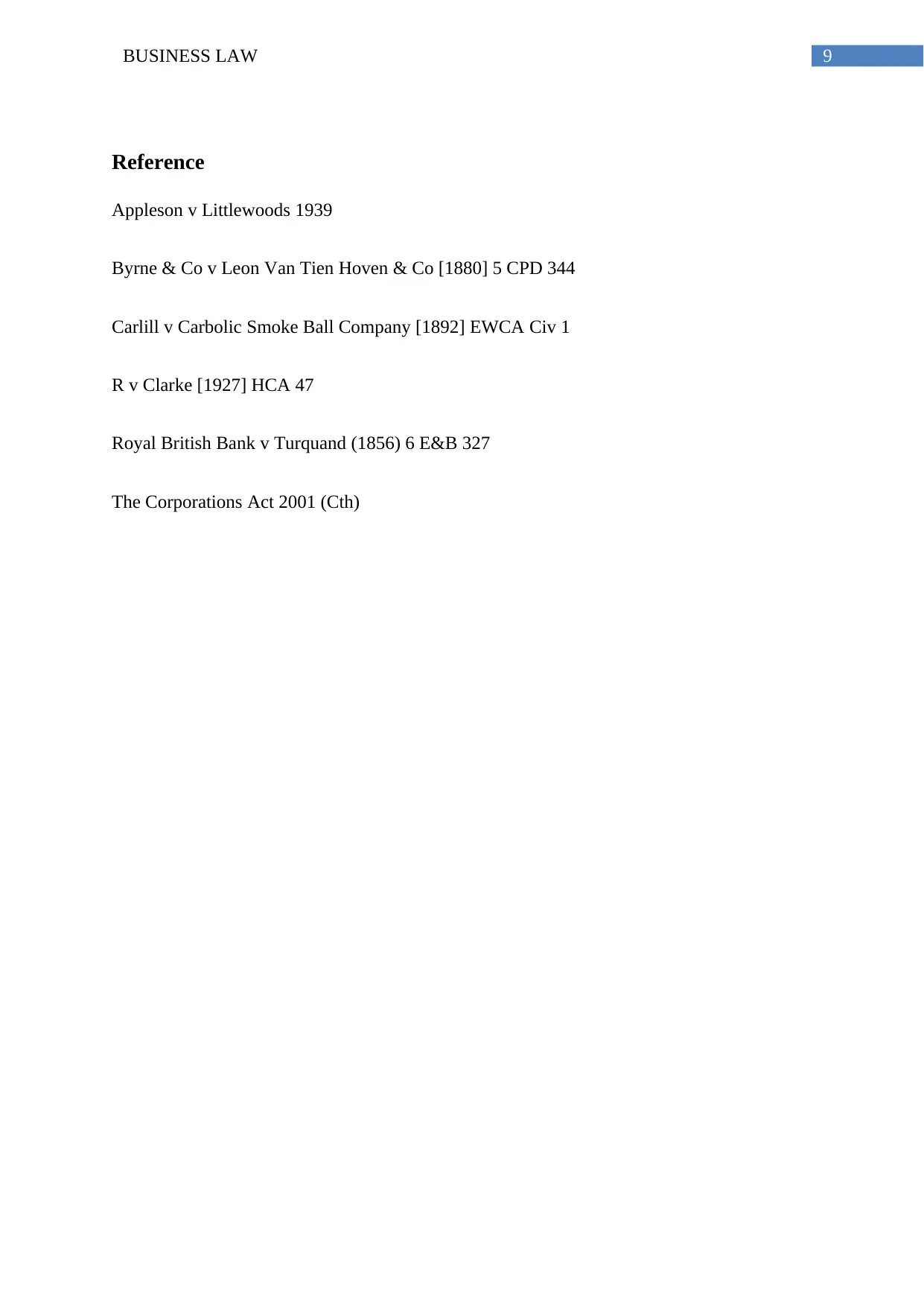
9BUSINESS LAW
Reference
Appleson v Littlewoods 1939
Byrne & Co v Leon Van Tien Hoven & Co [1880] 5 CPD 344
Carlill v Carbolic Smoke Ball Company [1892] EWCA Civ 1
R v Clarke [1927] HCA 47
Royal British Bank v Turquand (1856) 6 E&B 327
The Corporations Act 2001 (Cth)
Reference
Appleson v Littlewoods 1939
Byrne & Co v Leon Van Tien Hoven & Co [1880] 5 CPD 344
Carlill v Carbolic Smoke Ball Company [1892] EWCA Civ 1
R v Clarke [1927] HCA 47
Royal British Bank v Turquand (1856) 6 E&B 327
The Corporations Act 2001 (Cth)
1 out of 10
Related Documents
Your All-in-One AI-Powered Toolkit for Academic Success.
+13062052269
info@desklib.com
Available 24*7 on WhatsApp / Email
![[object Object]](/_next/static/media/star-bottom.7253800d.svg)
Unlock your academic potential
Copyright © 2020–2026 A2Z Services. All Rights Reserved. Developed and managed by ZUCOL.





